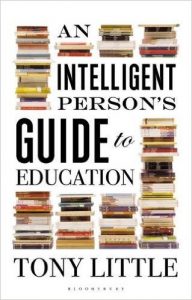 An Intelligent Person’s Guide to Education by Tony Little
An Intelligent Person’s Guide to Education by Tony Little
Reviewed by David Lorimer
Some readers may know that Tony Little has just retired as Head Master of Eton College – this very engaging book is his formal educational swansong, although he will still be involved in many aspects of education, and indeed a new Centre for Innovation has just been opened and named after him. He was a year behind me at Eton and we met up again when he was teaching at Tonbridge where I shared a flat with him on my teaching practice in the late 1970s. The Provost Lord Waldegrave has hailed Tony as one of the great Head Masters of Eton, held in high esteem and affection. This wise and humane book will show the reader why and will appeal equally to educationalists, parents and teachers.
Along with many others, including colleagues at the Birmingham University Jubilee Centre for Character and Virtues, Tony is very critical of the measurement culture in schools, while recognising its value. He frequently quotes AC Benson, an Eton beak from 100 years ago, with whom he shares a basic educational outlook – for instance the value of dedication and that great teachers use their heads but teach from the heart. He begins by considering what schools are for, using an enlightening exercise taken from Benjamin Franklin about the very different priorities of education for Native Americans. He regards the measurement culture as a way of increasing the dependency of the pupil on the teacher and therefore limiting the scope for creative inspiration – pupils are cleverly funnelled through the exam system. Tony is radical in suggesting the abolition of GCSEs so that we come to rely on a final rather than intermediary outcome of education. What really matters in a school is the people and the quality of their relationships. This constitutes the school ethos, which is apparent at Eton from a very early painting of a classroom scene dating from 1520 where the quotation reads (in Latin) ‘the excellence of the teacher is to identify the differences in talents of pupils.’
His two chapters on adolescence, then on sex, drugs and rock ‘n’ roll are really excellent and can be profitably read by all concerned parents. He quotes a wonderful letter from John McConnell, a housemaster in my day, sketching the drastic changes that often take place around the age of 15 but stressing that ‘at this moment when he seems to need you least, he needs you most.’ Indeed, listening and being open and supportive is absolutely critical for parents. Tony also brings to bear some interesting neurobiology that helps explain some of the changes going on in the adolescent brain. He is therefore sympathetic to the boy who, when asked why he acted in a bizarre fashion, replies that he didn’t know why he did it. This chapter finishes with some very good practical tips for parents. Tony is equally sensible when addressing the issues of sex, drink and drugs, again with some very good advice.
This leads on to a chapter on character and discipline and enables him to explain the philosophy of education to be found at Eton. He recommends treating teenagers with trust, even though they may frequently let people down. He advocates giving them an opportunity to lead, to learn to deal with failure and to encourage ambition. He draws on his experience of a peculiar Eton tradition called the Bill, where boys are directly disciplined by the head – this gave him an opportunity to convey and discuss values. In addition, he made himself available for half an hour in the morning for any boy to come and see him – about four a day took advantage of this for a variety of reasons.
The next chapters discuss the importance of imagination and originality before moving on to a consideration of spirituality, which for him is represented by wonder. He stresses the importance of a sense of belonging as well as making space for both traditional religion and what he calls spiritual humanism. It is refreshing to find a chapter devoted to ways of encouraging reading at different ages – my tutor used to read aloud to us, and I remember the Aeneid, the Iliad and Barchester Towers from that time. He then has his own list of books that every bright 16-year-old should read. It is an interesting compilation.
Tony gives some inspiring examples of schools that have been turned around and of his own experience of visiting all sorts of different types of establishment. Establishing high expectations is critical, then engendering a sense of accountability, responsibility and ownership. There are then chapters on the relative merits of boarding and co-ed, based on his own varied experiences. He describes how he sees the role of a head with some amusing examples and telling advice, such as when he was told never to say yes in a corridor and, if accused by an individual teacher of some shortcoming, to ask the person concerned to provide six other people making the same complaint. He has equally wise words on dealing with support staff, parents, governors and former pupils. Finally, he has 10 key questions to ask of any school, which would be a good approach for any parent considering their own choice. The book is an instructive, illuminating and often amusing read.
